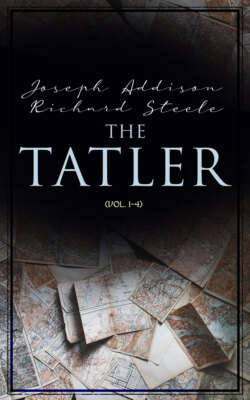Читать книгу The Tatler (Vol. 1-4) - Joseph Addison - Страница 62
From Tuesday May 10, to Thursday, May 12, 1709. From my own Apartment, May 10.
ОглавлениеHad it not been that my familiar had appeared to me, as I told you in my last, in person, I had certainly been unable to have found even words, without meaning, to keep up my intelligence with the town: but he has checked me severely for my despondence, and ordered me to go on in my design of observing upon things, and forbearing persons; "for," said he, "the age you live in is such, that a good picture of any vice or virtue will infallibly be misrepresented; and though none will take the kind descriptions you make so much to themselves, as to wish well to the author, yet all will resent the ill characters you produce, out of fear of their own turn in the licence you must be obliged to take, if you point at particular persons." I took his admonition kindly, and immediately promised him to beg pardon of the author of the "Advice to the Poets,"194 for my raillery upon his work; though I aimed at no more in that examination, but to convince him, and all men of genius, of the folly of laying themselves out on such plans as are below their characters. I hope too it was done without ill-breeding, and nothing spoken below what a civilian (as it is allowed I am) may utter to a physician. After this preface, all the world may be safe from my writings; for if I can find nothing to commend, I am silent, and will forbear the subject: for, though I am a reformer, I scorn to be an inquisitor.
It would become all men, as well as me, to lay before them the noble character of Verus the magistrate,195 who always sat in triumph over, and contempt of, vice; he never searched after it, or spared it when it came before him: at the same time, he could see through the hypocrisy and disguise of those, who have no pretence to virtue themselves, but by their severity to the vicious. This same Verus was, in times long past, chief justice (as we call it amongst us) in Fælicia.196 He was a man of profound knowledge of the laws of his country, and as just an observer of them in his own person. He considered justice as a cardinal virtue, not as a trade for maintenance. Wherever he was judge, he never forgot that he was also counsel. The criminal before him was always sure he stood before his country, and, in a sort, a parent of it. The prisoner knew, that though his spirit was broken with guilt, and incapable of language to defend itself, all would be gathered from him which could conduce to his safety; and that his judge would wrest no law to destroy him, nor conceal any that could save him. In his time, there were a nest of pretenders to justice, who happened to be employed to put things in a method for being examined before him at his usual sessions: these animals were to Verus, as monkeys are to men, so like, that you can hardly disown them; but so base, that you are ashamed of their fraternity. It grew a phrase, "Who would do justice on the justices?" That certainly would Verus. I have seen an old trial where he sat judge on two of them; one was called Trick-Track, the other Tearshift;197 one was a learned judge of sharpers, the other the quickest of all men at finding out a wench. Trick-Track never spared a pickpocket, but was a companion to cheats: Tearshift would make compliments to wenches of quality, but certainly commit poor ones. If a poor rogue wanted a lodging, Trick-Track sent him to gaol for a thief: if a poor whore went only with one thin petticoat, Tearshift would imprison her for being loose in her dress. These patriots infested the days of Verus, while they alternately committed and released each other's prisoners. But Verus regarded them as criminals, and always looked upon men as they stood in the eye of justice, without respecting whether they sat on the bench, or stood at the bar.
